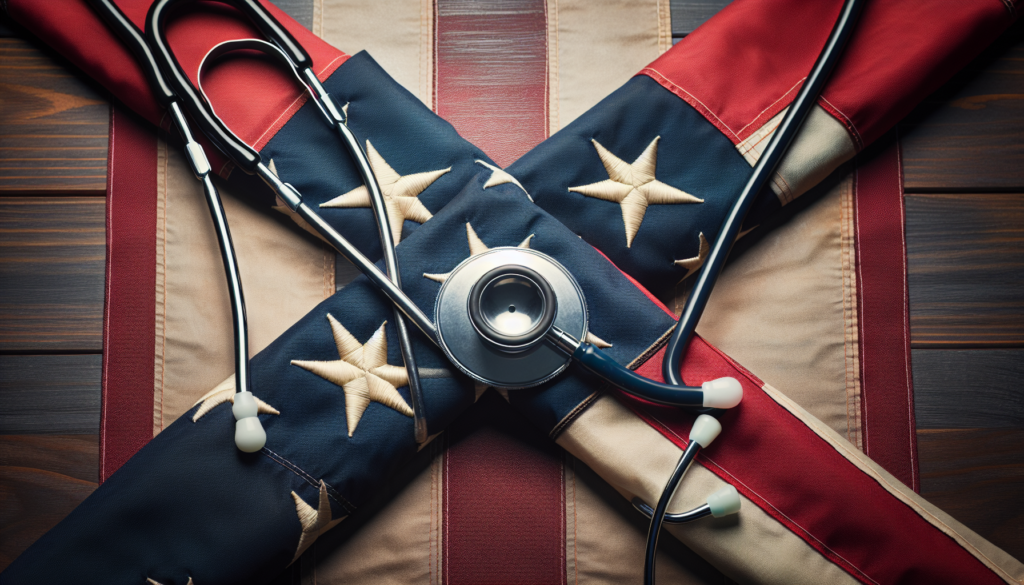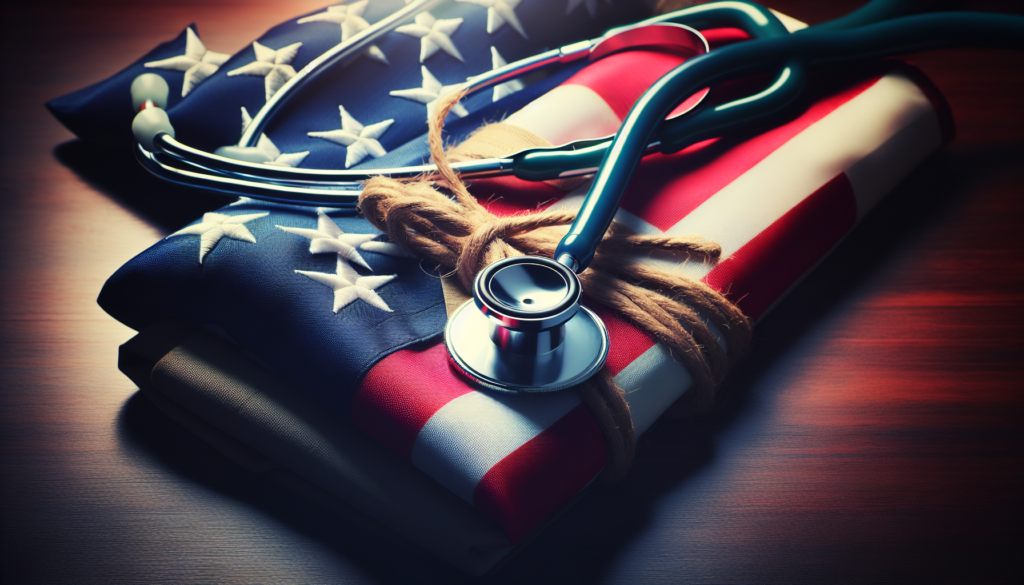Embarking on a journey through civilian life after serving in the military can often seem like uncharted territory, but “Veterans’ Lifelong Healthcare Guide” is your personal compass in this new adventure. Your courage and dedication resonate beyond your years of service, and honoring that, this guide aims to shine a light on the various healthcare options and benefits that you’ve rightfully earned. It provides a supportive space where you can effortlessly navigate through healthcare intricacies, financial aid, and invaluable community connections, ensuring that the transition into post-service life is not only smooth but also fulfilling. For every question you may have, from “Do Veterans get free healthcare for life?” to understanding your benefits, your answers lie within this ever-expanding repository of knowledge and shared experiences, tailored specifically for you, the hero now at home.
Understanding Veterans’ Healthcare Eligibility
Eligibility Criteria for VA Healthcare
You may wonder if you’re eligible for VA healthcare, and the answer depends on several factors, including the length and type of your military service, your discharge status, income level, and whether you have service-connected disabilities. Generally, if you served in the active military and were discharged under conditions other than dishonorable, you might be eligible for VA healthcare benefits.
Enrollment Process for Veterans
Enrolling in VA healthcare is easier than you might think. You can apply online, by phone, by mail, or in person at your local VA Medical Center. To get started, you’ll need to gather some documents, such as your military discharge papers (often called DD214) and personal identification. Once enrolled, you’ll receive a Veterans Health Identification Card (VHIC), which you’ll use to check in for appointments and access services.
Service-Connected vs. Non-Service-Connected Benefits
The terms “service-connected” and “non-service-connected” are important. Service-connected benefits apply if you are suffering from a disability or health condition that was caused—or made worse—by your active military service. Non-service-connected benefits are available regardless of whether your health issues are linked to your service. Your categorization influences the priority level for receiving certain benefits as well as your cost for services.
Free Healthcare: Myths vs. Facts
One of the biggest myths is that veterans get free healthcare for life. The reality is more nuanced. Many service-related health needs could be provided at no cost, but other services may have associated co-pays depending on your VA priority group and the specific benefit being utilized.
Navigating the VA Healthcare System
The Role of VA Medical Centers
VA Medical Centers are the cornerstone of the VA healthcare system. You can receive a wide range of services at these centers, including primary care, specialty care, and inpatient services. Think of them as your hub for healthcare needs, helping coordinate and provide the medical support you need.
How to Find VA Healthcare Providers
To find VA healthcare providers, you can start by visiting the nearest VA Medical Center or clinic. You can also use the VA’s online locator to find facilities and providers near you. VA providers work within the system to offer integrated care specifically tailored for veterans.
Coordinating Care with Non-VA Doctors
There are times when you might need to seek care outside of the VA system. In such cases, the VA offers the Community Care Program, where you can access healthcare services from community providers. However, this requires prior authorization from the VA, so it’s important to coordinate with your VA healthcare team to ensure continuity of care.
Specialized Programs for Women Veterans
As a woman veteran, you have access to specialized programs that address your unique healthcare needs, including reproductive health, maternity care, and gender-specific care. The VA is committed to offering equitable, high-quality care in a welcoming and respectful environment.

This image is property of images.pexels.com.
Managing Veterans Health Benefits
Understanding Your VA Health Benefits
To make the most of your health benefits, it’s essential to understand what is covered. You can access a variety of services, ranging from preventive care to complex surgeries. Your benefits package can also evolve over time, so it’s crucial to stay informed about any changes.
Keeping Track of Benefits and Services
Stay on top of your healthcare benefits by keeping records and logging into the My HealtheVet platform. Here you can track appointments, communicate with healthcare providers, refill prescriptions, and view your personal health record.
Changes in Benefits Post-Discharge
Maybe you’re transitioning out of service. It’s paramount to understand how your benefits may change after discharge. It’s common for certain benefits to have eligibility periods post-service, especially for those related to combat or deployment.
The Appeals Process for Denied Claims
If you face a denied claim, don’t lose hope. The VA has an appeals process that allows you to contest the decision. You can submit new evidence and request a review, which can often be a path to achieving the desired outcome.
Comprehensive Health Services for Veterans
Physical Health Services and Support
From routine physicals to specialized surgeries, the range of physical health services with the VA is wide. Take advantage of the support for health conditions both common and complex, always tailored to your needs as a veteran.
Mental Health Resources and Counseling
Addressing your mental health is just as vital as physical health. You can access counseling, therapy, and treatment programs to support your wellbeing. Dealing with PTSD, stress, depression, or anxiety is not something you have to do alone.
Rehabilitation and Long-Term Care Options
For those who need rehabilitation or long-term care, options are available through VA services. These include various therapies, home health care, community living centers, and other resources to aid in your recovery and care.
Dental, Vision, and Hearing Care Coverage
Though dental benefits are limited to certain groups of veterans, know that vision and hearing care are typically covered by VA health benefits. Depending on your individual qualifications, you could receive comprehensive care in these areas.

This image is property of images.pexels.com.
Preventative Care and Wellness Programs
Importance of Preventative Health Measures
Preventative care is key to maintaining your health. The VA offers a host of preventative services, such as health evaluations and screenings that can detect issues early when they’re more manageable.
Fitness and Nutrition Programs
Staying active and eating well are important for your overall health. VA fitness and nutrition programs provide you with the knowledge and support to make healthy lifestyle choices, which can lead to lasting positive health outcomes.
Health Screenings and Immunizations
Regular health screenings and staying up-to-date on immunizations are easy ways to take charge of your health. These preventative measures can help prevent illnesses and detect conditions early.
Wellness Resources and Lifestyle Management
Manage stress and adopt a healthier lifestyle with the variety of wellness resources the VA offers. Programs and workshops can provide support on topics ranging from smoking cessation to stress management.
Accessing Specialized Veteran Care
Care for Combat-Related Injuries
Combat-related injuries, such as amputations or burn injuries, require specialized care. Rest assured, the VA has resources to help you recover and adapt, ensuring your best possible quality of life.
Treatment for PTSD and Traumatic Brain Injury
For those coping with PTSD or a traumatic brain injury, the VA has specialized programs designed to aid in your recovery. With the latest treatments and support, you can work towards healing both mentally and physically.
Substance Abuse Programs
Should you find yourself struggling with substance abuse, know that the VA offers programs for recovery. From detoxification to ongoing therapy, resources are there to help you on the road to recovery.
Assistance for Homeless Veterans
If you’re facing homelessness, the VA provides dedicated programs aimed at securing housing, employment, and health care to get you back on stable footing.

This image is property of images.pexels.com.
Financing Veterans’ Healthcare
Understanding VA Healthcare Costs
Get acquainted with how VA healthcare costs work. While many services may be covered entirely, some may require copays. Your priority group, service connection, and financial situation will influence costs.
Insurance and Veterans: Tricare and Other Options
Tricare and other health insurance options are available for veterans. Understanding how these plans work with VA benefits can help you maximize your coverage while minimizing out-of-pocket expenses.
Financial Assistance Programs
Should financial concerns arise, there are assistance programs to help you cover healthcare costs. Be sure to explore all available options through the VA, which may provide relief or subsidies.
Dealing with Co-Pays and Out-of-Pocket Expenses
Understanding your co-pays and out-of-pocket expenses is imperative. The VA offers a financial assessment to determine your responsibility towards healthcare costs, ensuring transparency and fairness.
Transitioning from Military to Civilian Healthcare
Preparing for the Transition
Transitioning to civilian healthcare can be a significant change. Prepare by familiarizing yourself with civilian health systems and understanding how your VA benefits will work in the new context.
Continuity of Care After Leaving Service
Maintaining continuity of care is vital. Plan ahead for how you will receive ongoing treatments, manage prescriptions, and maintain your health records as you transition from military to civilian healthcare.
How to Access Civilian Healthcare Systems
Learning how to navigate civilian healthcare is an important step in your transition. Explore networks, find providers, and understand your new health insurance coverage to make the process smoother.
Employer-Based Health Insurance Post-Service
After leaving service, you may have access to employer-based health insurance. Determine how this new insurance can complement or replace your VA benefits, and what the most cost-effective approach might be for your situation.

Educational Resources for Veterans on Healthcare
Health Education Workshops and Seminars
Take advantage of health education workshops and seminars offered through the VA. They are a great way to learn more about your health, treatment options, and how to live a healthier life.
Online Resources and Learning Portals
Explore online resources and learning portals provided by the VA. They offer convenient access to a wealth of information on health topics relevant to veterans, making it easier for you to stay informed about your health.
Literature and Pamphlets for Veterans
The VA provides an array of literature and pamphlets that can help you understand your health benefits, conditions, and wellness strategies. Don’t hesitate to ask for these materials during your appointments or visit the VA website to download them.
Partnering Organizations for Veteran Education
Numerous organizations partner with the VA to offer further education and support for your healthcare needs. Engage with these groups for additional resources and community support tailored to veterans.
Veterans’ End-of-Life Care and Support Services
Hospice and Palliative Care Services
When facing end-of-life care, hospice and palliative care services through the VA are there to provide comfort and support to you and your family, emphasizing quality of life and dignity.
Bereavement Support and Counseling
The loss of a fellow veteran can be tough. The VA offers bereavement support and counseling to help you navigate grief and honor the memory of those who have served alongside you.
Planning for End-of-Life: Wills and Advanced Directives
Preparation is key, and that includes having wills and advanced directives in place. The VA can assist you in planning, ensuring your wishes are respected and your family is informed.
VA Burial and Memorial Benefits
Finally, understanding your VA burial and memorial benefits is essential. The VA provides burial benefits and memorial services to honor your service and ensure you are commemorated with the respect you deserve.
Your service to your country has earned you a comprehensive range of healthcare benefits and services. While navigating them may sometimes feel overwhelming, remember that you are not alone. Resources, assistance, and a community of fellow veterans are available to help you maximize your benefits, manage your health, and maintain your wellbeing at every stage of life.

